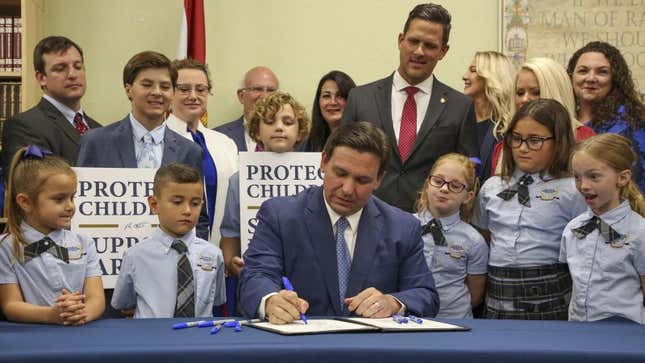Florida’s ‘Don’t Say Gay’ Law Is Actually a ‘Don’t Be Gay’ Law
The pithy nickname of a new Florida law targeting queer youth conceals some of its most terrifying features.
Politics

Florida Gov. Ron DeSantis signed the Parental Rights in Education Act—better known as the “Don’t Say Gay” bill—on Monday, and the highly restrictive legislation is sending shockwaves across the country. In response to the new law, which will severely constrain basic teaching on gender and sexuality, well-meaning advocates are attempting to take a stand by rolling out billboards that encourage people to “say gay.”
What’s getting lost in the dialogue about the law, particularly due to its pithy nickname, is that it entails more than merely banning students and educators from saying the word “gay,” nor can it be counteracted, unfortunately, by defiantly uttering the word. Florida’s Parental Rights in Education Act builds upon a rich history of right-wing attempts to invoke supposed parental concerns as an excuse to hack away at young and marginalized people’s rights, and to impose the GOP’s political agenda in schools, sometimes under the guise of warped notions of objectivity.
Following Florida lawmakers’ logic, any curriculum alluding to queer identity or supports for queer students will automatically make more students gay. DeSantis’ staff has argued that such curriculum is tantamount to “grooming” because of the innate perversion of non-cis, hetero lifestyles. Thus, Florida’s new law will ban “instruction on sexual orientation or gender identity,” which could go as far as prohibiting books that so much as include queer characters or historical figures.
-

-

-

-

-

-

-

-

-

-

-

-

-

-

-

-

-

-

-

-

-

-

-

-

-

-

-

-

-

-

-

-

-

-

-

-

-

-

-

-








































